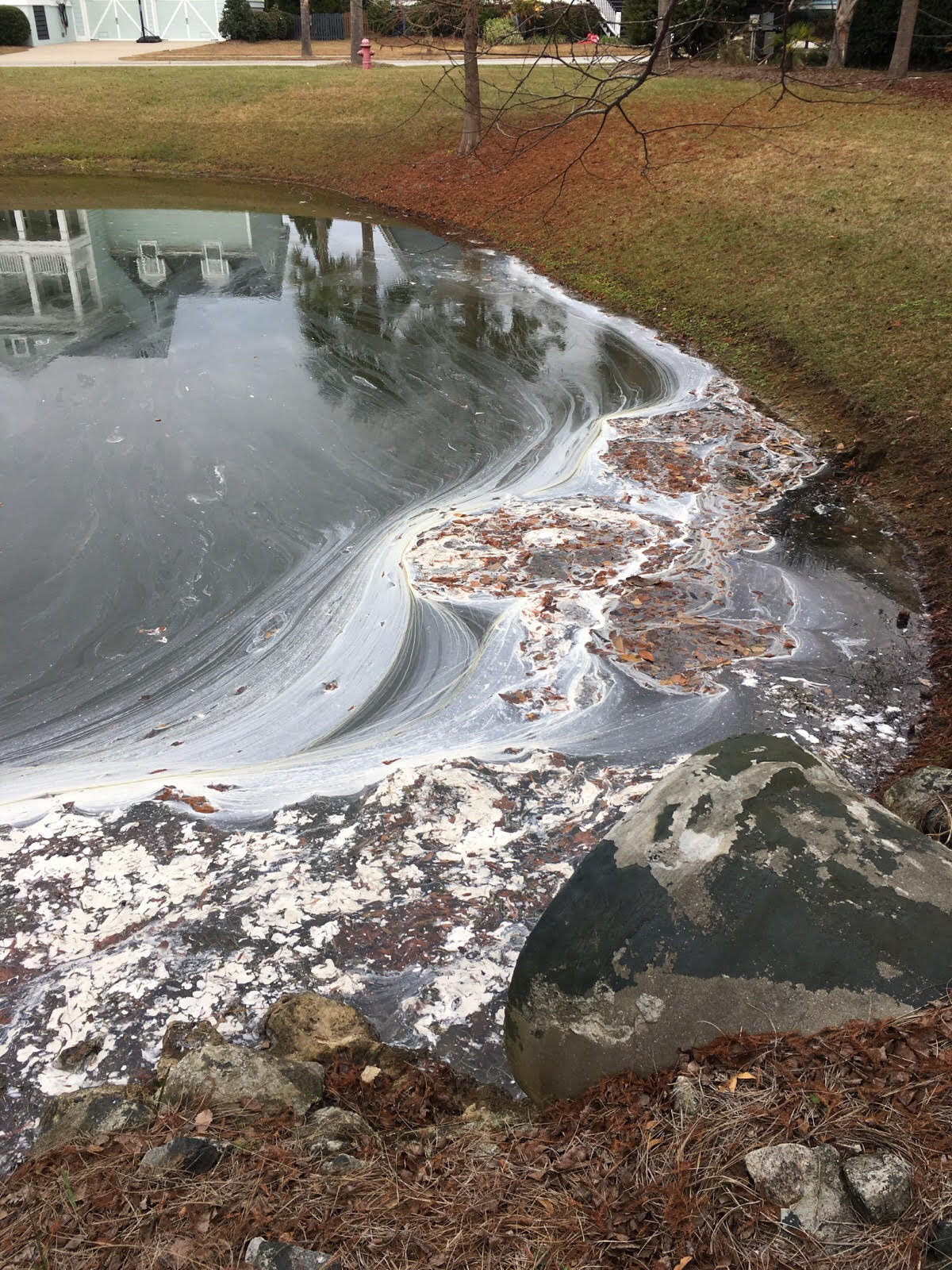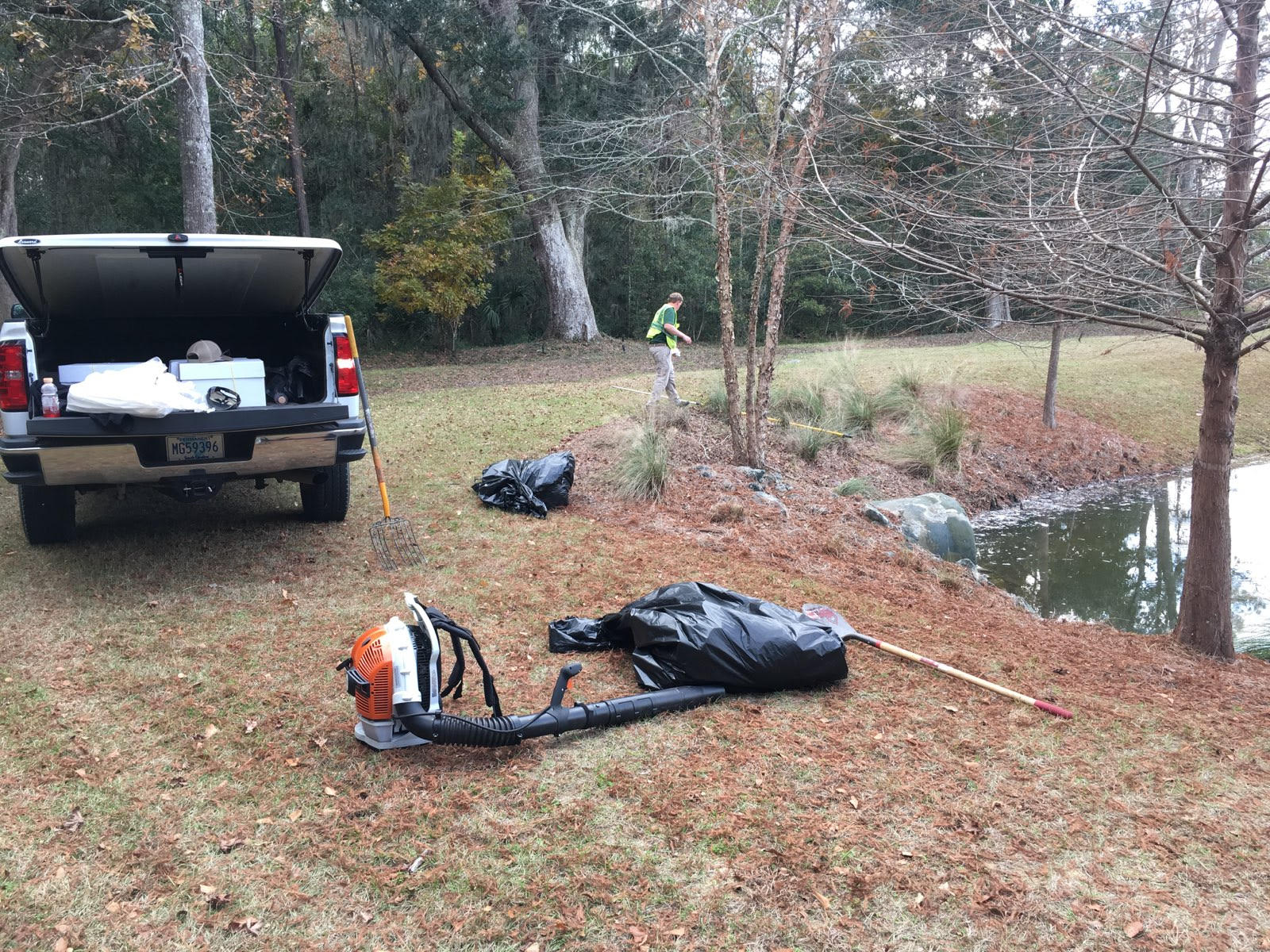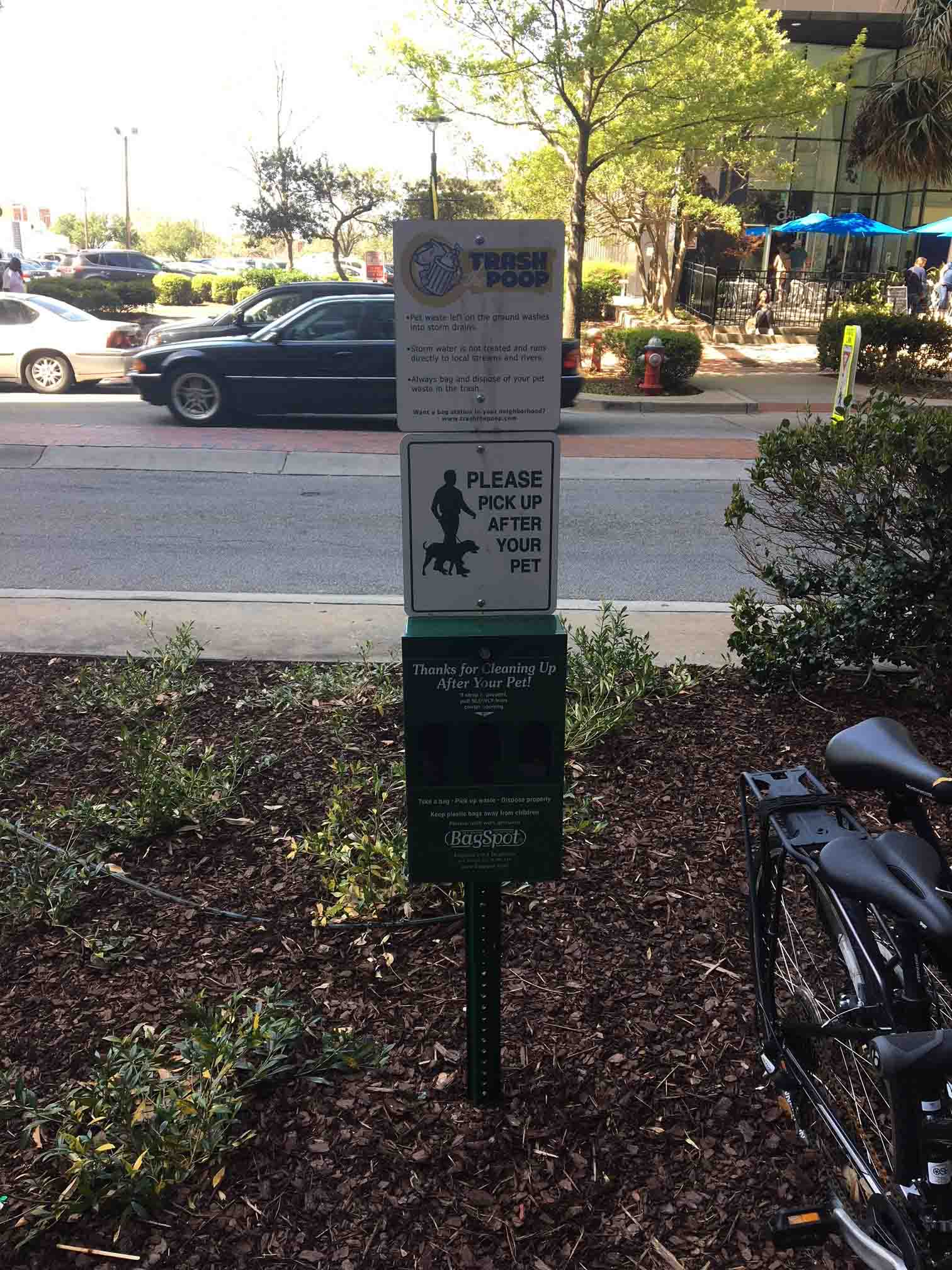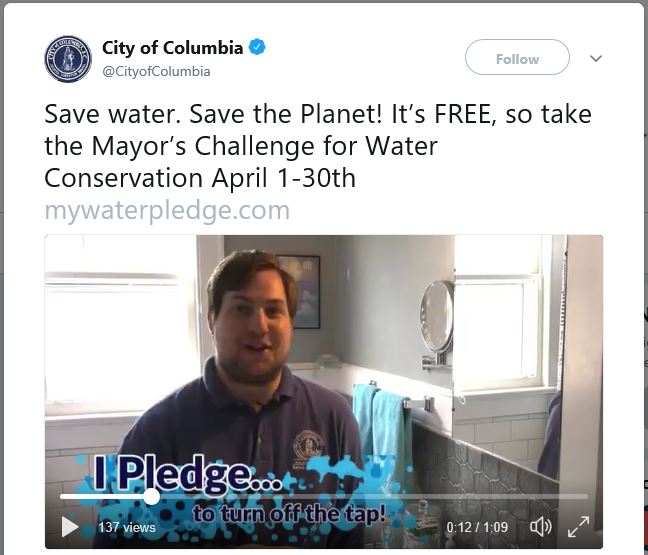It was oily, about two school buses large and spreading.

The Town of Mount Pleasant's Spill Response Team catches incidents — such as this one, in which someone dumped paint into a neighborhood pond — before substances enter the stormwater drain and pollute surrounding watersheds. Photo: Town of Mount Pleasant Spill Response Team.
The sheen of motor oil was drifting across the pond's surface — the unfortunate result of a resident's decision to dump a gas-and-oil mixture down the drain in a yard.
First, the Town of Mount Pleasant fought the spill with booms — large socks filled with oil-absorbent material.
Then the town fought the spill with education.
Because the pond was part of neighborhood governed by a homeowner association, town officials sent an email to the HOA offering tips on getting rid of used oil, Environmental Protection Agency flyers on homeowner best practices, a no-dumping flyer that the town staff created, and its local discharge advertisement to share with residents via the HOA's own communication channels.
"Our main goal was to provide the property manager with some informational tips they could share with the community," said Stormwater Manager Hillary Repik.
Her department uses outreach flyers and products from its education partners, Clemson's Carolina Clear and Ashley Cooper Stormwater Education Consortium, along with educational products that are tailored for commercial and construction companies.

The Town of Mount Pleasant's Spill Response Team uses added training, targeted informational materials, an upfitted public services truck, and minimal supplies to protect groundwater, ponds, watersheds and creeks. Photo: Town of Mount Pleasant Spill Response Team.
Clemson Extension's Carolina Clear program works with municipalities, counties, universities and other groups, providing workshops, resources, tools, demonstration projects and events to raise public awareness of stormwater issues and promote behaviors that protect the state's water resources.
For instance, Carolina Clear offers cities signs that say "Please hold the bread. It's making us sick" to install around their stormwater ponds, urging the public not to feed bread to the geese. Doing so gives the birds digestive problems and prompts them to stay put instead of migrating, which ultimately causes the water to become polluted by waste.
Pet impacts
Geese aren't the only culprits.
More than 6,000 dogs and cats are registered with the department that serves the City of Columbia and Richland County. A single dog produces almost a pound of waste every day.
Dog waste — like herbicides, insecticides, oils and grease — is "nonpoint source" pollution because it doesn't come from a single source, such as a discharge pipe. Pet waste carries bacteria, parasites and worms that pollute waterways, potentially sickening people, pets and wildlife by transmitting diseases and releasing excess nutrients into the water, which cause toxic algal blooms.

Educational signage on one of the City of Columbia's pet-waste bag stations explains that residents should "trash the poop" in order to prevent waste from polluting streams and rivers.
Photo: City of Columbia.
The City of Columbia, like other municipalities, is required to offer educational outreach as part of its National Pollutant Discharge Elimination System permit.
A municipal separate storm sewer system — known more commonly as an MS4 — must meet public education and outreach requirements to satisfy the conditions of its NPDES stormwater permit.
"Municipalities have a great deal of flexibility in choosing exactly how to develop and implement this particular control measure to meet their NPDES permit requirement," said James Pinckney, an external affairs official in the EPA's Region 4 office in Atlanta.
"Therefore, in developing the public education and outreach program, municipalities can vary the degree and complexity of this program component to effectively address local water quality concerns."
In Columbia, as in other cities and towns, residents occupy a wide spectrum of awareness of their role in controlling water pollution.
"It's been eye opening dealing with pet owners because you've got one side that is really conscientious and another side that either assumes that it's good for the grass, like horse manure — which is not the case — or just don't want to worry about it," said Jennifer Satterthwaite utilities communications coordinator for the city.
Neighborhood listserves chronicle a host of frustrations and misconceptions about efforts to keep pet waste and other pollutants from washing down storm drains.
"It's a flashpoint issue for sure," said Satterthwaite.
For instance, in Columbia, residents may rake their leaves and other yard trimmings into a heap at the curb to be swept up by the city. But when dog walkers drop a bag of waste on top of a curbside leaf pile, they unknowingly scuttle that entire leaf pile's pickup because the waste cannot be mulched.
Civic investment
It's difficult to categorize a typical offender, which means it can be difficult to customize stormwater education efforts for a specific audience.
"You have to remember there is a pretty large chunk of our population that's transient," said Satterthwaite. City workers have observed that college students have been some of the more careless residents when it comes to disposing of their dogs' waste. It's a tendency that could have something to do with students' status as temporary residents who may plan to move away after graduation.
But even very young schoolchildren seem to have a lot to learn about the importance of keeping pet waste out of the environment.
"When I've been to schools speaking with younger kids, very few of them knew about this," said Nell Orscheln, utilities communication coordinator for Columbia. "I was surprised by that."
In contrast, Satterthwaite and Orscheln encountered an older woman who said her husband "does his rounds." He walks through the neighborhood disposing of any pet waste he sees.
"Older generations may be more engaged in citizenship," said Satterthwaite.
Saving water
While safe, clean water is vital, so is making sure there is enough to go around. Through the month of April, Columbia officials challenged residents to pledge a change in habits in order to reduce water consumption.

The City of Columbia took to Twitter to share testimonials from residents about its water conservation campaign.
Pledge takers participating in the Wyland National Mayor's Challenge for Water Conservation committed to any number of actions and habits, such as fixing leaky toilets, taking shorter showers, only sprinkling the lawn before 8 a.m. to ensure the water is absorbed instead of evaporated, and using refillable water bottles instead of disposable ones.
Other measures are less obviously tied to water but still help reduce water usage or protect water quality. For instance, avoiding food waste means easing the demand on farming and livestock operations, which consume substantial amounts of water.
Mary Pat Baldauf, sustainability facilitator, said the Wyland Foundation provided all the public outreach resources for the nonprofit national community service campaign, including an informational kit with press materials.
"It's fairly turnkey," she said of the water challenge campaign.
"You can do as little or as much as you want to do. We just jumped in and embraced it a little more this year."
